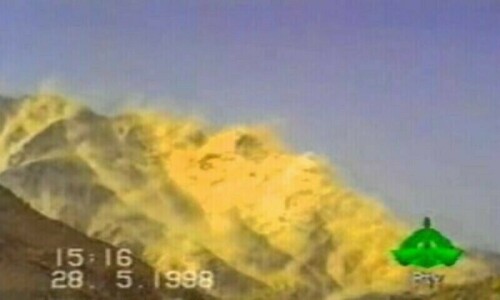ISLAMABAD: Opposition parties, on Friday, not only managed to restrain Defence Minister Khawaja Asif from presenting the draft resolution on the Yemen crisis to a joint sitting of parliament they also succeeded in convincing the government to make significant changes to the original draft.
This meant that there were smiles all round at the end of the day as the draft resolution — which focused more on Pakistan’s role as a ‘bridge builder’ than becoming a party to the conflict — was adopted by the joint sitting in the presence of Prime Minister Nawaz Sharif.
A couple of participants from Friday’s meeting of heads of parliamentary parties confirmed to Dawn that a number of significant changes were made to the draft that the government had originally prepared.
Take a look: Parliament calls for neutrality in Yemen conflict
In its original resolution, the government had mentioned self-exiled President Abd Rabbuh Mansur Hadi as the legitimate head of the Yemeni government and described the Houthi militants as rebels.
“Our point of view was that by accepting Mr Hadi as the legitimate president and Houthis as rebels, we are taking sides. Therefore, we should avoid sending this message that we are becoming a party,” the leader of an opposition party told Dawn.
Secondly, the government had restricted its cooperation with Gulf Cooperation Council (GCC) countries to combating terrorism and extremism in the region, all of which, except Oman, had joined the Saudi-led coalition against Houthis in Yemen. On the insistence of opposition parties, the clause was extended to include “all other regional countries”, such as Turkey and Iran.
Moreover, the government’s efforts to broker a ceasefire in Yemen with the help of UN Security Council and the Organisation of Islamic Conference (OIC) was also included in the final resolution at the suggestion of PTI and PPP leaders, the participant of the meeting said.
Most importantly, the emphasis on maintaining neutrality was made part of the final draft at the behest of the PTI and fully supported by the PPP, he said.
According to another participant of the meeting, the government’s original proposals mainly reflected its unflinching support for the territorial integrity of Saudi Arabia and did not represent the sense of the house, where a majority of speakers were supporting staying neutral. “This is where the PTI and PPP asked to add clauses in the final draft that were more representative of the sentiments of the house.”
Taking credit for the comprehensive and consensus-based resolution, PTI Vice Chairman Shah Mehmood Qureshi told mediapersons outside parliament that the PTI was the only party that had come to the huddle with a resolution of its own.
According to him, “The government’s proposals had certain flaws, which, after the incorporation of our party’s suggestions, completed the draft resolution.”
During the morning meeting of heads of parliamentary parties, PTI leaders Shah Mehmood Qureshi and Dr Shireen Mazari had said that if the defence minister read out the resolution, their party would walk out, a National Assembly source privy to the meeting told Dawn.
Later, in his remarks to the media, Mr Qureshi said, “We have supported the resolution and rejected the defence minister for his un-parliamentary demeanour towards the PTI leadership.”
After the parliamentary leaders agreed on the text of the resolution, “We categorically told the sitting that Khawaja Asif is not acceptable to present this good work to the house,” Mr Qureshi said, recalling the defence minister’s scathing attack on the PTI upon their return to the house, where he had called them “shameless” and “immodest”.
Last Monday, as the relevant minister, Mr Asif had moved the resolution on the Yemen crisis for discussion in the house. This meant that he would also conclude the debate by reading out the draft resolution agreed upon by all parties.
However, it was a surprise for those in the press galleries when Prime Minister Nawaz Sharif asked Finance Minister Ishaq Dar to present the draft resolution instead. A government source told Dawn that the PM was duly informed about the PTI’s objections and in response, for the sake of unanimity, asked Senator Dar to carry out the formality.
“I think the PM did the right thing, because otherwise it would have sent a wrong message,” one of the people present in the morning meeting of parliamentary heads told Dawn on condition of anonymity.
Published in Dawn, April 11th, 2015
On a mobile phone? Get the Dawn Mobile App: Apple Store | Google Play












































